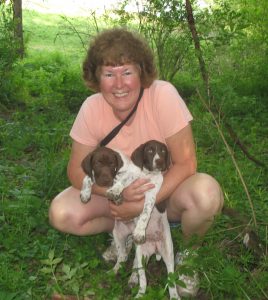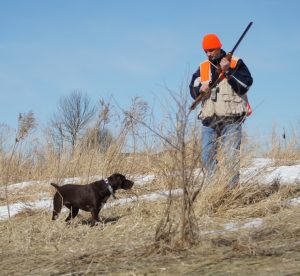Pointing Dog Pointers: Puppy or Started Dog?
POINTING DOG POINTERS
By Bob and Jody Iler
Now that spring is here, your thoughts may turn to getting a puppy as your future hunting partner. Everywhere you look, puppy articles and pictures abound. And the return of spring after a long, hard winter seems to goes hand in hand with visions of a roly poly puppy bounding across the grass.
But should you get a puppy? Or—should you get a “started dog”?
Your new pup is a “clean slate.” Other than the care and socialization she’s had since birth at her breeder’s, the pup of seven or eight weeks is too young for any major training or bird dog development to have been done yet. Let’s look at some pros and cons of getting a puppy to develop into your future bird dog.
Advantages
- If you’re watching your wallet, a pup will generally be less expensive than a started dog.
- You’ll experience the enjoyment of seeing your pup grow and mature.
- You’ll have a sense of pride and accomplishment in socializing, developing and training your pup.
- There are not many things better for your soul than the joy that a puppy brings to your life!
Disadvantages
- Do you have the time and energy it takes to properly develop and train your pup?
- Got patience? Sometimes it may take a year, even more, to see if your pup will make it as a good hunting dog.
- Do you have, or are you willing to learn, the skills necessary to train your pup?
- If not, can you afford to enlist the services of a professional trainer down the road?
- With worming and shots, pup’s veterinary bills can be more expensive. There is also the possibility that your pup could develop a health issue that could limit his abilities in the field.
We trained a beautiful little French Brittany one year that developed severe hereditary problems with her hindquarters during training, which resulted in expensive surgery. She ended up as a loved house pet because she was physically unable to hunt.
These are just a few of the issues to consider as you think about buying a pup. In our opinion, having the time to spend with a pup is paramount. You can learn how to train your pup, but if you haven’t got the time to be part of the pup’s transition from babyhood to young adult, it might be best to think about getting a started dog instead.
Just what, then, is a started dog?
Our definition of a started dog is one that is approximately between the ages of eight and 15 months old. The started dog is developed to the gun, hunting and pointing, handling well, and possibly retrieving and honoring. He’ll be well-started in the yard work commands of heel, here and whoa. He’ll have a good health guarantee and up to date records. In short, the started dog is one that you should be able to “grab your shotgun and go hunting with.” Here again, let’s look at some pros and cons for comparison.
Advantages
- The started dog is ready to go hunting once you and she have bonded and feel comfortable together.
- When you first consider a particular started dog for purchase, you can evaluate the prospect in the field with a view to the type of hunting dog you want. You can see firsthand—before you commit—the drive, range, nose, pointing ability and mature conformation of the dog, plus possible retrieving and honoring abilities.
- The started dog will have had all necessary health updates and, if past a certain age, may also be tested and certified free of certain health issues (hips, elbows, etc.).
Disadvantages
- After looking at the pros and cons, you can see that there are tradeoffs. If you spend less money on a puppy compared to a started dog, you may also have to miss out on a hunting season until he’s developed and ready to go hunting. Pups are not trained according to a timetable, and you’ll need to make sure yours is developed at his own pace and not rush things because of the calendar. The upfront cost for a started dog can be quite high, often ranging from $1,500 to several thousand dollars.
- The started dog has been trained and developed by someone else, not you. You’ll want to spend time with the trainer/owner to find out just what commands etc. are used and how the dog is handled. You’ll want to see what kind of rapport exists between the dog and handler; is the dog happy and excited to get out and hunt, or is he working mechanically without a lot of zest? These things can point to what kind of training program the started dog has had (positive development vs. a more “forced” approach).
- Problems may come up that you are not initially aware of: an “escape artist” dog, a poorly socialized dog, a kennel dog that is not housebroken, etc.
- You’ll need to take extra time to form a bond with the started dog before setting out as hunting partners since you did not raise her yourself.
If you opt not to train your own pup for hunting and take her to a trainer instead, you may end up paying the same (or more) as you would have paid to purchase a started dog that would be all set to go in the upcoming season.
As you can see, there’s really no right or wrong answer here. The decision should be up to you based on what best fits your lifestyle, needs and expectations. There are many good trainers offering excellent started dogs. And there are top notch puppy breeders who have great pups available and will help get you started on the right road, because they know their dogs and can even choose a pup that might be best suited to you.
Take your time, do some research, and enjoy your new dog—whether a bright-eyed pup that will tug at your heartstrings or an eager started dog ready to become your hunting partner!
Pointing Dog Pointers features monthly training tips by Bob and Jody Iler, who own Green Valley Kennels in Dubuque, Iowa. Bob and Jody have trained pointing dogs for over 35 years and have written many articles for The Pointing Dog Journal.





